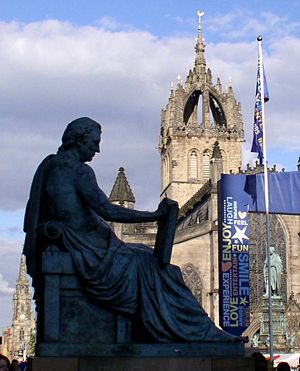David Hume: Difference between revisions
imported>Ro Thorpe mNo edit summary |
imported>Ro Thorpe m (→Biography) |
||
| Line 7: | Line 7: | ||
==Biography== | ==Biography== | ||
Hume was the second son of a middle-class country family who lived in the south of [[Scotland]]. He studied at the [[University of Edinburgh]] for three to four years, left at age sixteen in preparation to become a lawyer, but soon gave that up. Two years later he had a nervous breakdown from his uninterrupted and passionate study of [[ | Hume was the second son of a middle-class country family who lived in the south of [[Scotland]]. He studied at the [[University of Edinburgh]] for three to four years, left at age sixteen in preparation to become a lawyer, but soon gave that up. Two years later he had a nervous breakdown from his uninterrupted and passionate study of [[philosophy]], and after recovering went to [[France]] for three years to write a book he published anonymously; ''A Treatise of Human Nature''. It wasn't very well received at the time and Hume, having failed to make an impact in [[London]] retired to his family home for the next eight years, producing at that time his volume of ''Essays''. There were better received, but Hume's criticism of religion prevented him from becoming a professor of Philosophy in Edinburgh in 1744. His convictions also prevented him from advancement in [[Glasgow]] years later. | ||
Revision as of 18:38, 3 January 2008

David Hume (April 26, 1711 – August 25, 1776) was a Scottish philosopher, economist, and historian. He is considered one of the most important figures in the history of Western philosophy and the Scottish Enlightenment. Although in recent years interest in Hume's work has centred on his philosophical writing, it was as an historian that he first gained recognition and respect.
Biography
Hume was the second son of a middle-class country family who lived in the south of Scotland. He studied at the University of Edinburgh for three to four years, left at age sixteen in preparation to become a lawyer, but soon gave that up. Two years later he had a nervous breakdown from his uninterrupted and passionate study of philosophy, and after recovering went to France for three years to write a book he published anonymously; A Treatise of Human Nature. It wasn't very well received at the time and Hume, having failed to make an impact in London retired to his family home for the next eight years, producing at that time his volume of Essays. There were better received, but Hume's criticism of religion prevented him from becoming a professor of Philosophy in Edinburgh in 1744. His convictions also prevented him from advancement in Glasgow years later.
In the following years Hume spent time tutoring a nobleman who was later certified as insane. However, Hume's prospects improved. He became secretary to a general who led a military expedition to the French coast and shortly after a secret mission to Vienna and Turin. These posts made Hume wealthy and he returned to Scotland, living comfortably with his brother and then, in Edinburgh, with his sister. During the next fifteen years he wrote his major works; The two Inquiries, the remainder of his Essays, two books on religion and the six volumes of the History of England.
From 1763 to 1766 he served as secretary to the British ambassador in Paris. Returning to London, he was appointed undersecretary of State. He resigned two years later as a result of poor health and spent the rest of his years in Edinburgh, revising his essays, conducting a large correspondence with many distinguished friends and became increasingly famous as an essayist and historian. He died from bowel cancer, maintaining his atheism to his last breath.